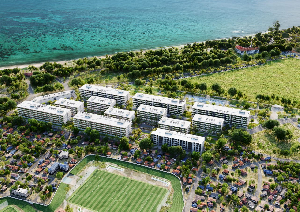Solidardidad, a non-governmental organisation working to transform the agricultural sector, over the weekend, launched of the National Initiatives for Sustainable and Climate-Smart Oil Palm Smallholders (NISCOPS) to support sustainable climate-smart production of the tree crop.
The NISCOPS is a five-year strategic programme aligned with existing national climate policy frameworks such as Ghana's Nationally Determined Contributions to climate change, environmental and spatial planning legislations.
The phased programme which started last year (2019), has commenced the implementation phase I and would continue to 2023 while implementation phase II will continue from 2024 and beyond.
Dr Samuel Ogallah, Senior Climate Specialist at Solidaridad and the NISCOPS Technical Director for Africa, said the programme was currently being implemented in only four countries – two in Africa (Ghana and Nigeria) and two in Asia (Indonasia and Malaysia).
He said the Netherlands Government has supported the programme with 12.5million Euros out of an estimated budget of 60million Euros in the four countries and that it comes with key performance indicators defined on livelihoods/productivity, mitigation and adaptation, noting that the key performance goals were defined by the beneficiaries themselves.
He said the programme was necessitated by the increasing impact of climate change on oil palm cultivation and that there is the need to consider the implications of the tree crop's plantation on climate.
Dr Ogallah said Ghana currently has about 360,000 hectares of oil palm under cultivation of which 80 per cent were cultivated by smallholders with average yield of four tons of fresh fruits bunches (FFB) per hectare per annum, adding with the NISCOPS programme, the yields could increase to about 16 tons FFB per/ha/year.
He said 60 per cent of the FFB produced by the smallholder were processed at mills with low technology leading to a low Oxygen Enhancement Ratio of 9 per cent, contributing climate change through the emission of Green House Gas emission.
He said the project is aimed at enabling governments in key producing countries to support and work with farmers towards more sustainable climate-smart palm oil production.
Dr Ogallah said Ghana's version of the project was being implemented in some 28 districts in the Ashanti, Eastern, Oti, Western, Central, and Ahafo regions carefully selected based on their climate vulnerability and adaptation.
In a speech read on his behalf to launch the programme, Dr Owusu Afriyie Akoto, Minister for Food and Agriculture, said there was a high demand to increase production in a world of ever increasing human population.
He said the Ministry has affirmed Climate Smart Agriculture as an approach for developing the country's agricultural strategies to secure sustainable food security and build resilient production systems and commodity value chains under climate change.
He said it was elated that NISCOPS programme aimed at making smallholder oil palm farmers more productive and resilient through implementation of climate smart agriculture, considering that oil palm was an important tree crop in the country, which contributes significantly to the economy.
To make the programme a success, a seven-member National Advisory Committee was inaugurated to advise the programme to achieve its objectives of among others, building capacity of smallholders, organisations, and local institutions to improve performance in the oil palm industry.
The Committee is comprised of representatives from the Oil Palm Development Association of Ghana, Environmental Protection Agency, Oil Palm Research Institute, Forestry Commission, National Development Planning Commission, Ministries of: Foods and Agriculture; Trade and Industry; Local Government and Rural Development; and Lands and Natural Resources.
Business News of Tuesday, 21 January 2020
Source: www.ghananewsagency.org
NISCOPS launched to promote sustainable and climate-smart oil palm production
Entertainment












